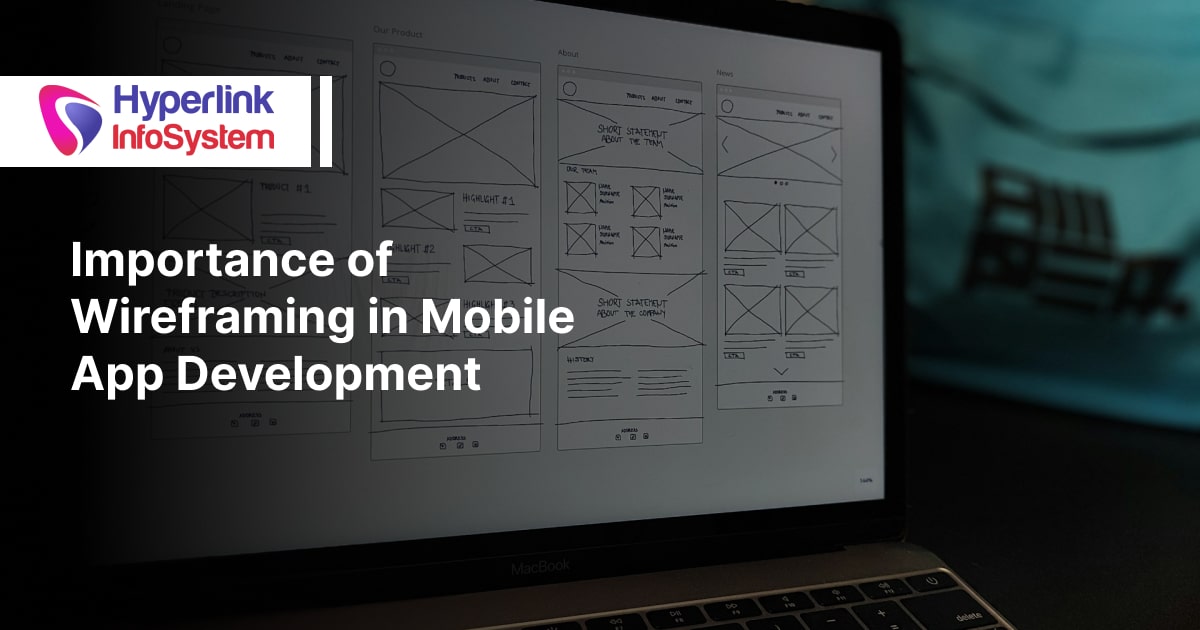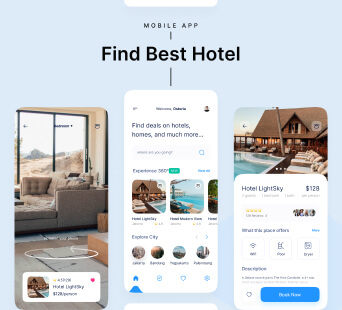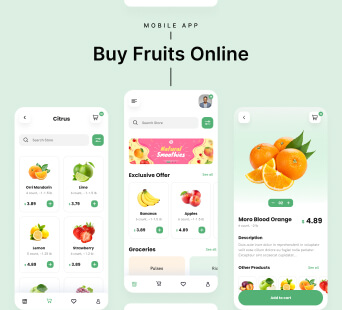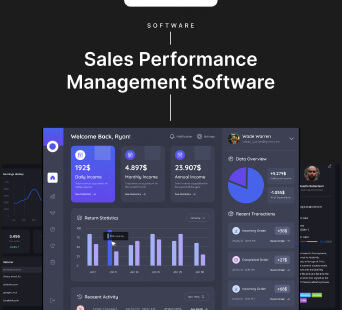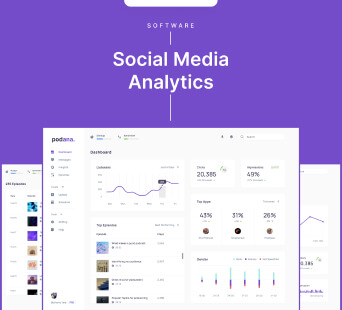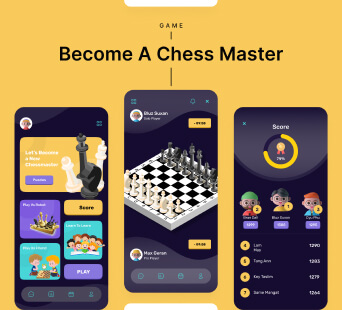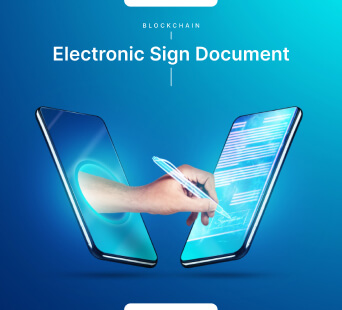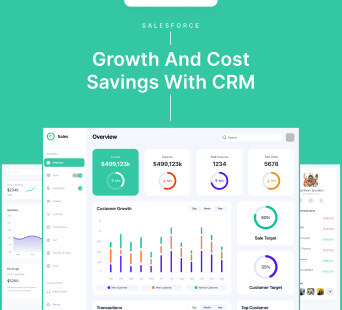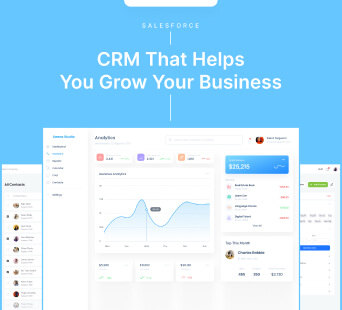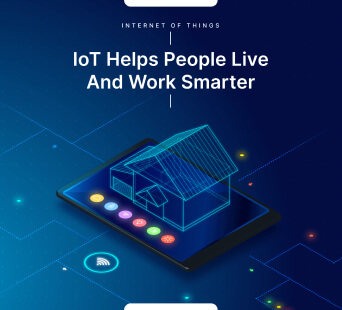With a diverse number of technologies orbiting the market, Node.js garners the best-in-class supporters and opponents. However, it's without a doubt that some of the pioneers in the industry like LinkedIn, PayPal, and Uber have holistically utilized Node.js for everything. Such a level of influence helps businesses make professionally smart decisions. So coming to the question at hand, what actually is Node.js?
Based on Chrome's V8 JavaScript engine, Node.js is an open-source runtime environment that performs efficiently across multiple platforms. Since it's JavaScript-based, it's extremely vital for interpreting and executing JavaScript codes. The I/O paradigm of Node is completely non-blocking and event-driven, which allows it to be swift and lightweight in functionality. Node.js is popularly used for developing apps and software that need live, synchronous interactions, like chat apps and websites. It is also loaded with additional features and apps making it a suitable choice for developers to handle multiple requests effectively without blocking.
How to Install Node.js?
NodeJS can be done individually or can also be implemented by hiring a nodejs development team. Let's see how back-end developers get started with Node.js:
-
Download: You can go to the official Node.js website, and start downloading the installation for your computer or laptop. Node offers a current and LTS version for all. Most people utilize the LTS (long-term support) version for their projects.
-
Install: In order to install Node, it's vital to follow the on-screen instructions. The website helps you install both Node.js and its NPM (Node Package Management).
-
Verify: After downloading and installing Node.js, you are enabled to open your command or terminal. After this, you can start running it by following the instructions mentioned on the website.
Benefits of Learning Node.js
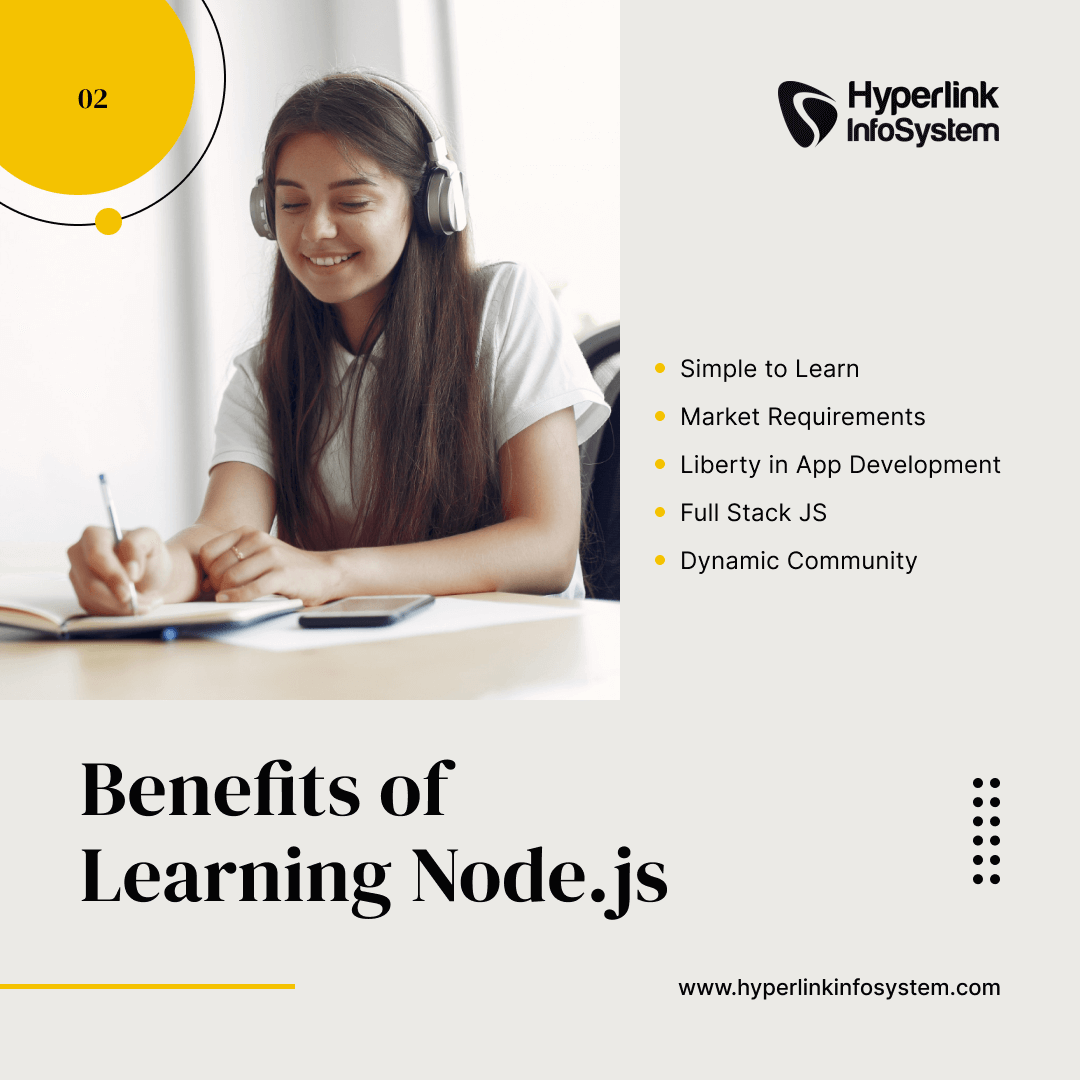
Node.js enables you to run JavaScript directly server-side, which helps you develop top-notch APIs and web apps. It is also a vital learning program if you want to begin your career in front-end or back-end programming. Some other benefits include:
Simple to Learn
Since Node is completely authored in JavaScript, many developers are pretty familiar with its programming fundamentals. Any coder, even a rookie or a beginner in JavaScript coding, can learn Node in less time and with less effort.
Market Requirements
In the world of IT, the demand for full-stack developers is not just a constant requirement but is constantly growing in demand. Many job postings specify the knowledge of Node as a bonus skill, adding this skill to your CV can help you propel your career forward into stack development. Plus, the salary package for a typical Node.js engineer goes up to $1,50,000 annually.
Liberty in App Development
Forget about Ruby on Rails, as Node now offers a great level of scalability and flexibility when it comes to application development. Freshly installing Node for your needs lets you begin with the bare minimum, enabling you to begin from scratch with only a few restrictions.
Full Stack JS
When it came to the rise of emergence in full-stack web development, Node gracefully took charge. Full-stack web development needs a single individual developer who'll work on designing and solving every area of the software which includes- database administration, and front-end and back-end development. Earlier, full-stack developers were required to learn multiple languages, but now using Node they can smoothly develop web apps by only using JavaScript.
Dynamic Community
Node.js boasts of a thriving online community filled with developers who are constantly sharing, discussing, and brainstorming every update about this language on different portals.
Node.js framework for web app development is continuously enhanced and empowers learning by rendering open access to a variety of solutions at all stages of development.
How Does Node.js Work?
Node is perfectly suitable for all kinds of APIs, microservices, and real-time applications. It can comfortably monitor a huge amount of concurrent requests virtually. Let's understand it's core functionalities:
1) Event Loop
The event loop can be considered as the base for Node.js. EL is a single-threaded, nonblocking system that manages all callbacks and task lists. Anytime you receive a request, Node doesn't form a new thread but moves it to the event queue. If any job needs slow I/O activities, Node won't wait for them separately to finish. Instead, it begins the I/O operations and moves toward the next job in the queue. After completion of the current I/O operation, the callback function is triggered, which is later added again to the EL for processing afterward.
2) Non-Blocking I/O
Utilizing non-blocking I/O, helps Node.js bypass getting clung in between slow operations. This functionality helps manage concurrent requests proactively without tampering with performance.
3) JavaScript Engine
The complete Node.js module runs on the V8 JavaScript engine. This is also the engine behind the mind-blowing capabilities of Google Chrome. JavaScript helps translate its code into machine code to enable computer comprehension.
4) Modules and Packages
Node.js comprises a huge ecosystem filled with previously written modules and packages that are only accessible via the Node Package Manager. NPM includes functionalities for many activities, which enable dedicated Node.js developers to craft sophisticated apps without reinventing the wheel.
How to Learn Node.js?
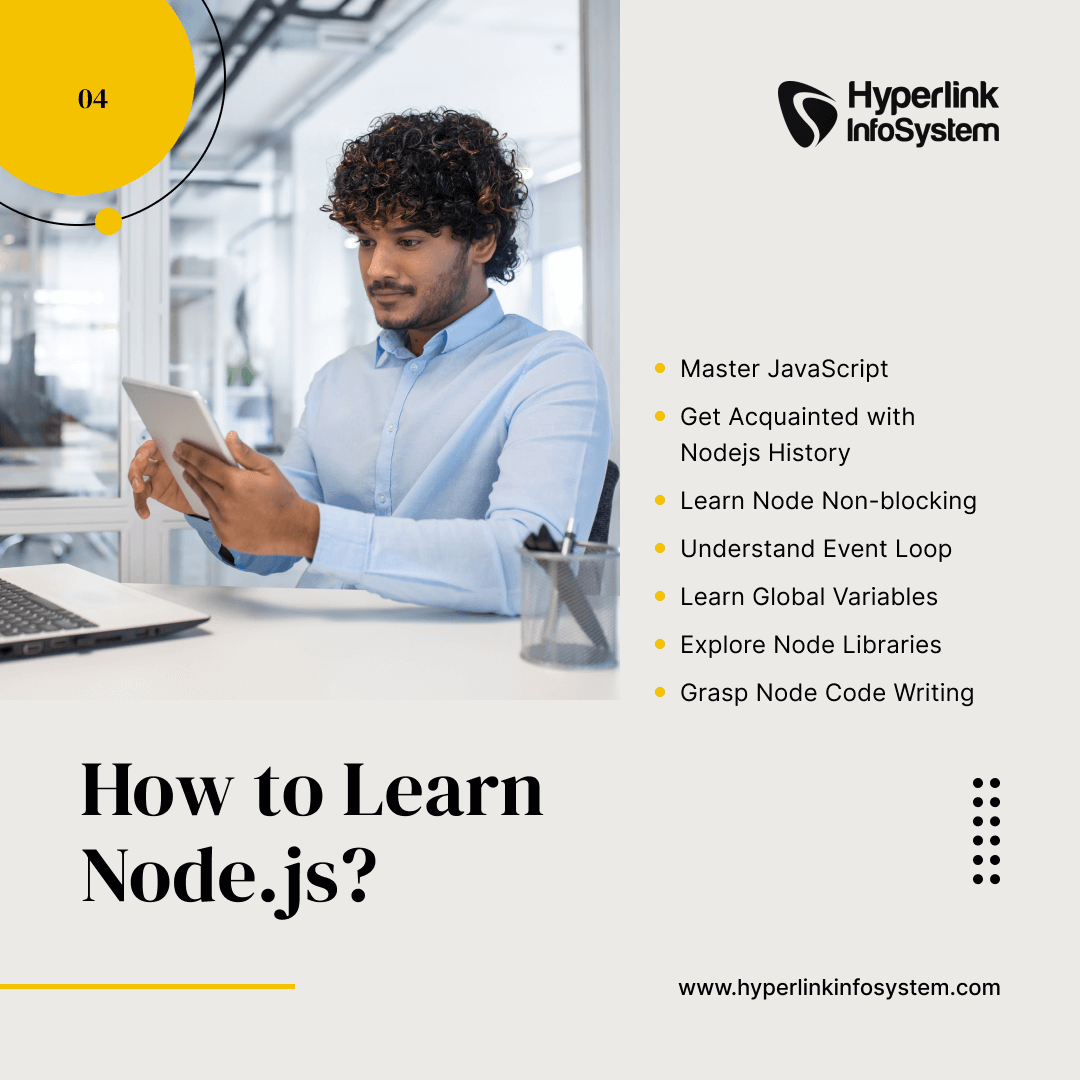
If you're looking to begin learning Node.js for web development, check out these tips:
1) Master JavaScript
Since Node is completely written in JavaScript, it's important that you become familiar with the language. This includes everything, such as callbacks, promises, functions, closures, module patterns, and classes, along with the properties of Maps, Sets, Arrays, Objects, Numbers, and Strings.
2) Get Acquainted with Nodejs History
Familiarizing yourself with the complete history and architecture of Node.js will help you obtain valuable insights on the subject. Your entire understanding will change by understanding things like why it's named Node because it's used to make standard single-process units, aka nodes. All nodes are structured, leveraging suitable networking protocols to establish transparent communication and scalable options.
3) Learn Node Non-blocking
Non-blocking is one of the core features of Node. It helps you understand how I/O operations are executed asynchronously, all while adhering to a non-blocking pattern. You can start by giving instructions to Node, tackling some arguments, giving callbacks, and taking instructions from previous lines. This helps in deriving better results from Node computation.
4) Understand Event Loop
The Event Loop system in Node.js comprises three elements: stack, heap, and queue. In a loop, the queue is canvassed for the upcoming message, and when it's located, the callback function for that particular message is invoked.
5) Learn Global Variables
To evaluate and preview all options, start by typing global in a Node REPL (read-eval-print-loop). Post this, you'll find all library functionalities of Node and JavaScript, in addition to Node global objects. You can also memorize their functionalities and possible usage.
6) Explore Node Libraries
Node.js comes with its own set of libraries. These libraries further help you run a TCP server along with the program sockets using “net,” how to read or write files with “fs,” along with understanding how to run a ready-to-stream web server using "http,” among several other tasks.
7) Grasp Node Code Writing
When it comes to Node.js development, it's important to read and grasp as much as possible about some of the top Node.js framework codes, which further make group reading even easier.
Resources to Learn Node.js
The above pointers are just for your reference to get you started on
best Node.js frameworks and development. When learning about Node, it's crucial to constantly keep programming practically. To master Node.js, it's important to learn more about it before utilizing it professionally. Below are some valuable resources and materials you can use to learn and spend more time on.
1) Professional Courses
For learning Node.js web development, old-school courses are one of the ways to go. Most Node courses are differentiated depending on your educational background and programming language learning curve. You can either opt for one-on-one tutoring or join regular classes to begin your journey.
2) Videos
Although there are official documents provided to learn Node, it might be intimidating to start if you're completely new to it. Hence, start with the compelling and user-friendly videos that are already present on websites and YouTube.
3) Tutorials
There are many online resources and tutorials available for learning about Node.js web development. Many
back-end developers start their free lessons by reading the popular Node Beginner Book to get started.
4) E-books
There are many resources available online for learning Node.js that range from beginner to advanced. Since, Node's an open source, so are its many other resources, for eg. Visionmedia. It is a popular open-source e-book ideal for getting started in learning Node.
5) Frameworks
When it comes to learning about top Node.js frameworks, it's vital to challenge yourself by tackling different kinds of frameworks. Whenever you join a Node.js development company, this is one of the earliest tests they conduct on candidates, so learn it well.
6) Blogs
There are a million blogs just prancing around the internet filled with information like- hiring dedicated Node.js developers, providing web app development services, and leveraging Node.js framework for web app development. Books can help you stay current and also learn about the history of Node.js and its architecture.
Why Choose Hyperlink Infosystem as Your Node.js Development Company in UK?
Hyperlink InfoSystem is a
top Node.js development company in UK providing web app development services across 20+ industries. Boasting a team of dedicated Node.js developers well-versed in harnessing the true power of Node.js, we help you build high-performing and scalable solutions. Our portfolio consists of successful Node.js tasks across diverse sectors. Hyperlink InfoSystem time and again showcases its capability to deliver custom app solutions tailored to client requirements and exceed client expectations every time.
Hyperlink InfoSystem follows a client-centric approach to align with every business objective. By maintaining open communication channels throughout the development process, our team ensures complete transparency in partnership. As a nodejs development company, we only focus on innovative solutions and trends surrounding the industry, which allows us to integrate cutting-edge solutions. We also follow an agile development methodology, which helps us stay adept at ever-changing requirements. This strategy enables businesses to guarantee faster time-to-market and deliver iterative feedback.
We also lay down a substantial emphasis on quality assurance throughout the development lifecycle by conducting rigorous testing processes and steps to monitor quality control. They also prioritize robust flexibility to allow swift integration with APIs and other third-party services. Hyperlink InfoSystem's global client base module helps them offer competitive pricing modules to optimize development and accurate resource allocation for reasonably priced solutions without hampering the quality. The final and most vital is our ongoing support and maintenance for smooth app operations post-launch. Hyperlink InfoSystem's dedicated support team across the globe is constantly present to quickly address issues and concerns that could envelope the future.
Conclusion
Node.js presents you with incredible possibilities for developing the best-in-class quick, robust, and flexible web applications. Getting started with Node.js can feel a little overwhelming in the beginning, but with the ideal guidance and correct resources, you'll be off to a great start in mastering this technology smoothly. At Hyperlink InfoSystem, we understand the level of complexities that are involved in the top Node.js frameworks. Hence, we're here to assist our clients throughout every process. Our exhaustive expertise in Node.js web app development helps businesses realize the true potential of this technology. Whether you're looking to begin a new project or expand your existing apps, our
dedicated Node.js developers are ready for your service.
FAQs
1) What is Node.js?
Node.js is an open-source, cross-platform runtime environment for JavaScript. This solution helps developers run their JavaScript code server-side. Node.js delivers a powerful platform for crafting efficient and scalable web apps and APIs.
2) Do you need to know JavaScript to learn Node.js?
The answer is yes. A decent amount of understanding of JavaScript is absolutely necessary before learning Node.js. Since Node.js is a runtime environment enforcing JavaScript codes outside browsers, a base level of understanding is needed. Being familiar with JavaScript syntax, functionalities, data types, and control flow will be advantageous in the future.
3) Is Node.js difficult to learn?
In order to learn Node.js, it'll be a lot easier if you have some base expertise in utilizing JavaScript. Node is fairly easy to learn once you've learned JavaScript, since, it'll lead you on the fast track towards Node.js web development and back-end as well. This level of knowledge also helps you become a full-stack developer.
4) Is Node JS in demand in 2024?
Being a top Node.js development company, hiring a nodejs development team for immaculate
web app development services is exclusively in demand at the moment. Statistically speaking, Node js development has experienced a staggering growth of 20% as compared to the last 5 years.
5) What are the benefits of using Node.js?
There are many benefits of using Node.js such as:
You have the liberty to utilize the same JavaScript code on the back end as well as the front end of your app.
Node.js comprises a huge ecosystem of open-source libraries and a Node.js framework for web app development, that helps in effortless management of different functionalities.
Any web app development services performed using Node.js are automatically quick in response and hold the capability to handle multiple connections simultaneously.
6) How do you install Node.js on your PC or laptop?
To get started with Node.js web development, you can install Node.js from their official website. The website contains detailed instructions following the installation of your operating system. After installing, you can verify it by activating the command prompt, typing node -v, or opening your terminal.
7) What's the difference between asynchronous and synchronous programming in Node.js?
Asynchronous programming lets multi-operation perform simultaneously without any interruptions in the main thread. On the contrary, in synchronous programming, the code is executed in a certain sequence, and further execution is stopped until the last operation is completed. However, top back-end developers recognize Node for its asynchronous and event-driven structure, making it suitable for I/O-intensive applications.






